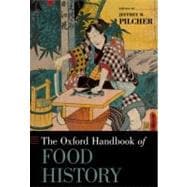
What is included with this book?
| Contributors | p. xi |
| Introduction | p. xvii |
| Food Histories | |
| Food and the Annales Schools | p. 3 |
| Political Histories of Food | p. 23 |
| Cultural Histories of Food | p. 41 |
| Labor Histories of Food | p. 61 |
| Public Histories of Food | p. 81 |
| Food Studies | |
| Gendering Food | p. 99 |
| Anthropology of Food | p. 117 |
| Sociology of Food | p. 135 |
| Geography of Food | p. 154 |
| Critical Nutrition Studies | p. 172 |
| Teaching with Food | p. 191 |
| The Means of Production | |
| Agricultural Production and Environmental History | p. 209 |
| Cookbooks as Historical Documents | p. 227 |
| Food and Empire | p. 241 |
| Industrial Food | p. 258 |
| Fast Food | p. 279 |
| The Circulation of Food | |
| Food, Mobility, and World History | p. 305 |
| The Medieval Spice Trade | p. 324 |
| The Columbian Exchange | p. 341 |
| Food, Time, and History | p. 358 |
| Food Regimes | p. 370 |
| Culinary Tourism | p. 389 |
| Communities of Consumption | |
| Food and Religion | p. 409 |
| Food, Race, and Ethnicity | p. 428 |
| National Cuisines | p. 444 |
| Food and Ethical Consumption | p. 461 |
| Food and Social Movements | p. 481 |
| Index | p. 499 |
| Table of Contents provided by Ingram. All Rights Reserved. |
The New copy of this book will include any supplemental materials advertised. Please check the title of the book to determine if it should include any access cards, study guides, lab manuals, CDs, etc.
The Used, Rental and eBook copies of this book are not guaranteed to include any supplemental materials. Typically, only the book itself is included. This is true even if the title states it includes any access cards, study guides, lab manuals, CDs, etc.